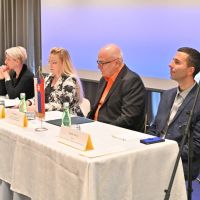(Re-)Bordering Tendencies in (Post-)Pandemic Europe. Covid-19, Borderless Europe and Cross-border Governance in the EU
Border Studies as topic + Knowledge sharing + RGBS | 01 December 2022
Border Studies as topic + Knowledge sharing + RGBS | 01 December 2022
The joint Research Group of Cross-Border Cooperation of the University of Public Service and CESCI offers the opportunity for students to take part in a series of lectures held by Prof. dr Jarosław Jańczak on different border studies topics during the autumn semester in 2022/23. On his 21st of November 2022 lecture, within the framework of the Month of Sciences series of events, the Polish scholar focused on the (Re-)Bordering Tendencies in (Post-)Pandemic Europe, Covid-19, Borderless Europe and Cross-border Governance in the EU.
The presentation held in the premises of the University of Public Service was preceded by the rector’s welcome speech. Dr Gergely Deli greeted the recently established Research Group stating that the University of Public Service and CESCI are doing an excellent job to bring together the different theoretical and practical fields related to border studies. He then briefly elaborated on the connecting and separating effects of the borders and encouraged the audience mostly made up by students to perform deeper research of these topics during their studies.
Dr Zsuzsanna Fejes, head of the research group invited prof. dr Jarosław Jańczak to hold his presentation. The speaker is a political scientist, Europeanist and border scholar. Since 2016, he has been an associate professor at the Department of International Relations at the Faculty of Political Science and Journalism at Adam Mickiewicz University in Poznań, Poland, and also at the Department of European Studies at the Faculty of Social and Cultural Sciences at the European University Viadrina in Frankfurt (Oder), Germany. His academic interests focus around the themes of borders and border areas within the context of European integration processes with particular emphasis on de-bordering and re-bordering phemonema, cross-border governance, European integration on the micro-scale, as well as cross-border cooperation in Europe. He is the author of over eighty academic articles, have participated in a similar number of academic conferences and been a visiting lecturer at over a dozen European universities.
The lecturer started his presentation by shedding light on how the borders are becoming again more important and contested in public discourse. With the migration crisis in 2015, the COVID-19 pandemic and subsequently closed borders, the Brexit and now the Russian aggression, it appears that the idea of a borderless world could succumb to be only a political myth.
In his presentation he was seeking answers on how have the current tendencies been influencing new paradigms of border dynamics in contemporary Europe. European history has been the history of shifting borders and currently what can be observed is the shifting interpretation of borders. Borders that used to be perceived as the instruments of power relations or obstacles are now considered social constructs based on norms, values and identities. Since the Helsinki Declaration signed in 1975 it is generally accepted that borders cannot be changed by force, however, their characteristics, functions, permeability and operational regimes do change.
Through the Europeanization process the European Union’s political and economic principles became a part of the logic of national politics and policy-making, and, in parallel, the reduction of internal borders was made possible partly through the Schengen Agreement. The ability for EU citizens to move freely within the EU is the most appreciated manifestation of European integration. This was challenged by the COVID-19 pandemic when in an attempt to stop the spread of the virus, the internal borders were suddenly closed by the member states halting not only tourism but also cross-border commuters negatively affecting many sectors. The lecturer also pointed at that every enlargement so far (except probably for the UK) was successful in a sense that it brought peace and prosperity and the alleviation of territorial disputes. At the same time the EU needs to politically prove that it is a success.
After the presentation Gyula Ocskay, CESCI’s Secretary General, offered closing remarks claiming that the lecture has given a comprehensive picture about the bordering and rebordering tendencies in the EU. He also added that the ongoing debate about the Schengen Borders Code also shows how relevant these topics are today. The event finished with Prof. Jańczak answering the questions raised by the audience.
Photo: Dénes Szilágyi

 10th anniversary of Rába-Danube-Váh EGTC
10th anniversary of Rába-Danube-Váh EGTC